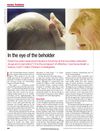 23 citations,
April 2010 in “Clinical, cosmetic and investigational dermatology”
23 citations,
April 2010 in “Clinical, cosmetic and investigational dermatology” Bimatoprost ophthalmic solution 0.03% safely and effectively increases eyelash growth when applied to the upper eyelid.
 10 citations,
October 2017 in “Dermatologic clinics”
10 citations,
October 2017 in “Dermatologic clinics” Aging in men is influenced by genetics and lifestyle, leading to muscle loss, bone issues, and skin damage.
 108 citations,
November 2006 in “The Milbank Quarterly”
108 citations,
November 2006 in “The Milbank Quarterly” Drug advertising has greatly increased, changing consumer behavior and raising concerns about its influence on healthcare and patient protection.
 19 citations,
September 2011 in “Seminars in Cutaneous Medicine and Surgery”
19 citations,
September 2011 in “Seminars in Cutaneous Medicine and Surgery” At-home laser and light skin devices are less effective than professional ones, with limited scientific evaluation, but some show promise for wrinkles, hair growth, and acne.
 139 citations,
February 2014 in “Journal of Advanced Research”
139 citations,
February 2014 in “Journal of Advanced Research” Vitamin D is important for skin health and may affect conditions like psoriasis and hair loss, but more research is needed to understand its role fully.
 128 citations,
September 2011 in “British Journal of Dermatology”
128 citations,
September 2011 in “British Journal of Dermatology” Obesity is linked to various skin problems and may increase the risk of skin cancer.
 117 citations,
August 2008 in “Sociology of Health and Illness”
117 citations,
August 2008 in “Sociology of Health and Illness” The conclusion is that the increasing use of drugs for lifestyle reasons is a complex issue influenced by corporate profit, consumer behavior, and the medicalization of everyday life, with potential negative effects on personal well-being.
 31 citations,
October 2002 in “Dermatologic Surgery”
31 citations,
October 2002 in “Dermatologic Surgery” Minoxidil helps stabilize hair loss, increase density, and reduce shedding after hair transplant surgery.
 29 citations,
February 2016 in “Scandinavian journal of urology”
29 citations,
February 2016 in “Scandinavian journal of urology” Late puberty may slightly lower prostate cancer risk, baldness is not linked to overall risk but less so with aggressive types, ibuprofen use may increase risk, and vitamins show no effect on risk.
 28 citations,
August 2003 in “Nature”
28 citations,
August 2003 in “Nature” Cosmeceuticals may have potential but their effectiveness and market success are still uncertain.
 18 citations,
October 2018 in “Nutrients”
18 citations,
October 2018 in “Nutrients” Annurca apple extract promotes hair growth by changing hair follicle metabolism to boost keratin production.
 15 citations,
August 2016 in “Current Urology Reports”
15 citations,
August 2016 in “Current Urology Reports” Nandrolone and oxandrolone could help treat male health issues like muscle loss and low testosterone.
 15 citations,
January 2016 in “Dermatologic Clinics”
15 citations,
January 2016 in “Dermatologic Clinics” Start acne treatment early to prevent scarring, consider antibiotic resistance, use maintenance therapy, and manage side effects carefully.
 13 citations,
September 2018 in “Dermatologic Therapy”
13 citations,
September 2018 in “Dermatologic Therapy” Finasteride effectively stops hair loss in most patients, but concerns about rare sexual side effects exist.
 11 citations,
August 1997 in “Expert Opinion on Therapeutic Patents”
11 citations,
August 1997 in “Expert Opinion on Therapeutic Patents” Many potential alopecia treatments need more testing to confirm they promote acceptable hair growth with minimal side effects.
 8 citations,
August 2018 in “International Journal of Dermatology”
8 citations,
August 2018 in “International Journal of Dermatology” The document concludes that doctors should carefully consider off-label drug use in dermatology and always inform patients, while more research is needed on the safety and effectiveness of such practices.
 8 citations,
May 1998 in “Journal of Oral and Maxillofacial Surgery”
8 citations,
May 1998 in “Journal of Oral and Maxillofacial Surgery” Acne is caused by increased sebum, abnormal skin shedding, bacteria, and inflammation, not dirt; treatments vary from creams to antibiotics or isotretinoin, with severe cases needing a dermatologist's care.
 7 citations,
September 2020 in “Journal of Cosmetic Dermatology”
7 citations,
September 2020 in “Journal of Cosmetic Dermatology” Minoxidil and Finasteride are the most popular hair loss treatments, with rising interest in other options, and economic or health crises can change what treatments people prefer.
 2 citations,
December 2020 in “Phytomedicine plus”
2 citations,
December 2020 in “Phytomedicine plus” Taking Saw palmetto and Pygeum africana can change the levels of certain steroids in urine, which could cause confusion in doping tests.
 2 citations,
June 2020 in “AIDS”
2 citations,
June 2020 in “AIDS” Recreational drug use can cause misdiagnosed conditions and drug interactions in HIV patients.
 1 citations,
January 2018 in “BMJ”
1 citations,
January 2018 in “BMJ” Many women experience significant hair loss during menopause, and topical minoxidil is an effective treatment.
 1 citations,
October 2002 in “Dermatologic Surgery”
1 citations,
October 2002 in “Dermatologic Surgery” Minoxidil can increase hair density, speed up regrowth in transplanted hair, and slow down further hair loss, especially beneficial for women, young men with thinning hair, and those wanting to reconstruct the back of the scalp.
 June 2024 in “British Journal of Dermatology”
June 2024 in “British Journal of Dermatology” Vitamin B supplements may reverse grey hair.
 January 2021 in “Journal of cosmetology & trichology”
January 2021 in “Journal of cosmetology & trichology” L-(+)-Tartaric Acid may help increase certain hair growth genes without harming cells.
 581 citations,
February 1998 in “The American Journal of Medicine”
581 citations,
February 1998 in “The American Journal of Medicine” Herbal remedies can cause adverse effects and need more safety research.
 359 citations,
September 2017 in “European Journal of Epidemiology”
359 citations,
September 2017 in “European Journal of Epidemiology” The Rotterdam Study updated findings on elderly health, focusing on heart disease, genetics, lifestyle effects, and disease understanding.
 244 citations,
September 2008 in “Annual Review of Genomics and Human Genetics”
244 citations,
September 2008 in “Annual Review of Genomics and Human Genetics” The document concludes that the fast-growing direct-to-consumer genetic testing market lacks sufficient regulation, posing risks to consumers due to questionable test quality and accuracy.
 219 citations,
March 2004 in “Journal of The American Academy of Dermatology”
219 citations,
March 2004 in “Journal of The American Academy of Dermatology” 5% and 2% minoxidil solutions effectively promote hair growth and reduce hair loss, with 5% being slightly more effective but having more side effects.
 207 citations,
April 2006 in “Journal of The American Academy of Dermatology”
207 citations,
April 2006 in “Journal of The American Academy of Dermatology” Iron deficiency may be related to hair loss, but there's not enough evidence to recommend iron screening or supplements for all hair loss patients.
 138 citations,
March 2001 in “Clinics in Dermatology”
138 citations,
March 2001 in “Clinics in Dermatology” Hair loss can significantly affect a person's self-esteem and body image, especially in young people, those who value their looks highly, and women.






























